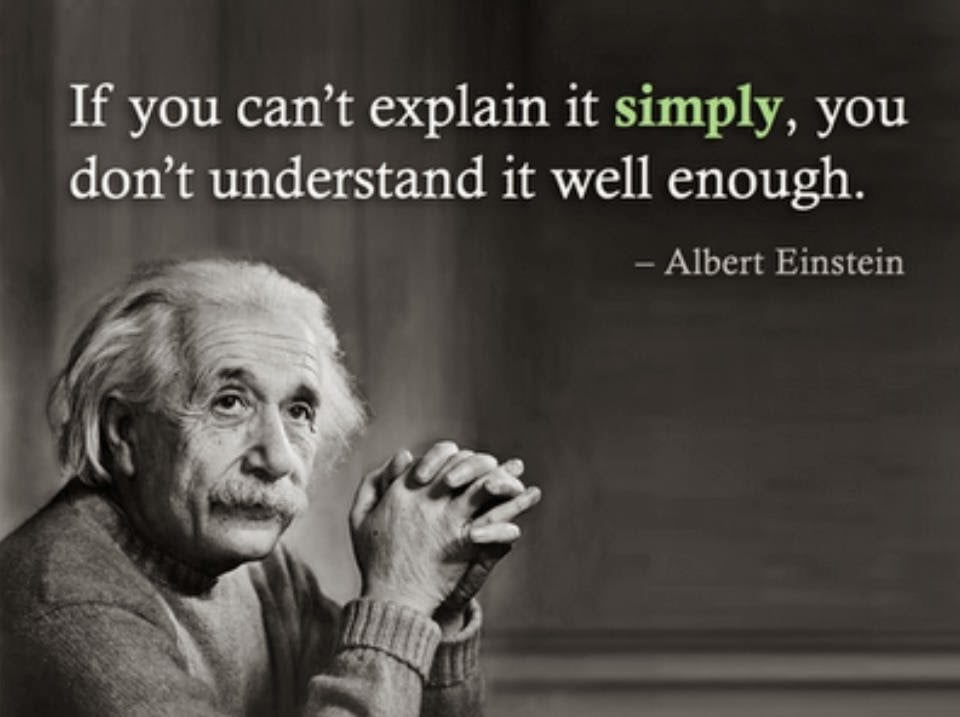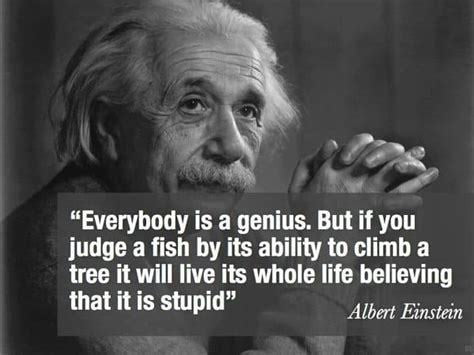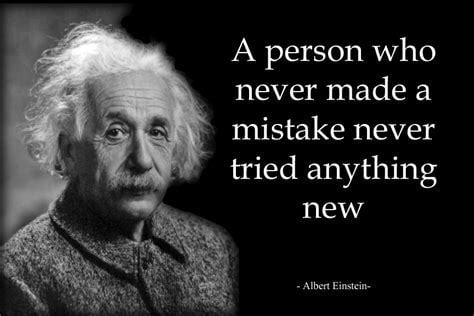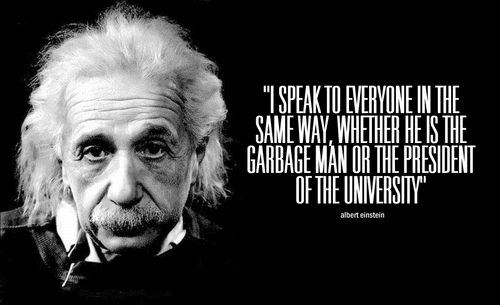Albert Einstein needs no introduction - the creative mind that transformed our understanding of reality, allowing us to progress form the deterministic Newtonian physics to a world where Artificial Intelligence, Quantum Computers, and our every day tool such as the GPS are a reality. I have taken a few famous quotes attributed to Einstein, and applied their relevance to the business systems in use today - and the relevance is remarkable, considering Einstein made his fame before the computer, the Internet, CRM, or Digital Marketing. I hope you enjoy reading this as much as I have enjoyed compiling this.

1. Keep it simple
Is your process as simple as it can be? Or do you have a hard time training new employees on your systems and procedures? A great way to tell is how much you rely for your day-to-day operations to a select few of people with the know-how regarding your processes. The challenge is not only in executing the process on a daily basis, it becomes even more apparent when something trivial changes in your process.
Let's unpack this a bit. A process is nothing but a step by step instruction describing a sequence of events and actions. A business application is part of your business process facilitating the execution of the process in high velocity and accuracy. So, if you cannot "explain" your process in a simple manner it means your business system will have instructions that are convoluted and complex. "Everything should be made as simple as possible, but not simpler" - Albert Einstein. In analysing your process, ask yourself this question: "does this step serve the desired outcome, or is it an unnecessary complexity added to cater for the exception?"

2. The right resource for the job
We think of this in terms of people - not everyone is equally equipped to do every job. Building a team is based on identifying the strengths and weaknesses of the people in the team, and by assembly maximise the use of the strengths and compensate for the weaknesses.
Surprise surprise - the same applies to your business applications. The biggest complicit in this offense the beloved Spreadsheet - it substitutes a business analysis tool, a CRM (Customer Relationship Management) system, and I have even seen instances of it used as an ERP (Enterprise Resource Planning) where the spreadsheet was used to plan and track the use of resources and equipment, sales and purchasing, and all financial transactions, including depreciation and tax. It is not a question of IF, but WHEN it fails. A CRM is not a human resource management information system - an accounting package is not a CRM, and a spreadsheet is not any of these things. Use applications as per their intent, and you'll get the best returns.

3. When things don't go as planned - learn and adjust
Let's face it, things never really go exactly as planned. In most cases, the adjustment we need to make is small and goes unnoticed. However, in complex systems, even small things can make a big difference in outcome - and there are many more ways these differences can be negative than positive in relation to your goal. So when things go wrong, it is an eventuality of trying something new - and we try something new because the old way did not yield the results we need. "We cannot solve our problems with the same thinking that created them" - Albert Einstein. Change is necessary if you want to move forward - and you have no choice but to move forward: "Life is like riding a bicycle. To keep your balance, you must keep moving is like riding a bicycle. To keep your balance, you must keep moving" - Albert Einstein
If learning is increasing your understanding, then it is equivalent to taking away complexity in your process. As a consequence, it is making your business applications simpler to use.

4. Ground yourself and stay humble
Elitism never really served anyone - same is for your business systems. If your processes are so complex, and as a consequence your systems have a hard time to keep up with this complexity - the answer is not simply to "hire better people". The triangle People, System, and Process needs to be optimised at all sides. A process that is too complex, will result in the demand for either systems or people capable of dealing with this complexity. Both of these will prove to be more expensive. Instead of stretching the systems and your people (remember the fish climbing the tree?), it is much better to look at simplifying the process - bring it back to the level of systems and people that the business can obtain and afford to retain. Acknowledge your business model is not as complex as you think it should be, and you'll find that serving your customers can be done with more speed and agility

5. Do, act, execute
The best laid plans are worthless without execution. A strategy without action is just an idea. In other words - if you want to bring about change, you do need to act. And when you act, you try something new - this will be successful in achieving the goal (of simplifying) or it will be another lesson to take into account for the next action. "Any intelligent fool can make things bigger and more complex... it takes a touch of genius - and a lot of courage to move in the opposite direction" - Albert Einstein. There is risk in every simplification of a business system that it either does not go far enough - but you cannot learn if you don't act.
Would Einstein have used Zoho?
Time travel permitting - would Einstein have used Zoho as his business suite of choice? Of course that is an academic and moot point. But does Zoho follow the principles laid out above?
- Keep it simple - Zoho One is a comprehensive business suite - but instead of one giant monolithic application that wants to do everything, it consists of many smaller applications that are very good at a limited number of things - and because they are integrated in a sensible way, there is no need for complex custom integration points to negate your efforts to keep your process running smoothly.
- The right resource for the job - Zoho One gives you access to over 40 different applications, each designed to execute the tasks in the most efficient and effective way. A CRM for your Customer Relationship Management needs, an Accounting package for your bookkeeping, and specialised applications for project management, inventory management, social marketing, email campaigns, etc. Zoho One also provides you with a website builder and hosting, website visitor tracking and engagement, website optimisation, as well as office productivity (email and calendar server, word processor, spreadsheet, presentations). To top it off, there is a full-fledged analytics suite at your disposal, to make sense of all your transactions.
- When things don't go as planned, learn and adjust - Zoho constantly releases improvements to the applications, and keeps adding new applications to the Zoho One suite as well. So you are not purchasing the applications as they are today, but also subscribe to the future enhancements of the suite, opening up more possibilities for you to simplify your processes.
- Ground yourself and stay humble - Zoho has maintained a simplicity in its application suite that allows you to implement the software with relative ease. If you know the domain (i.e. Accounting) then the applications are simple enough to understand and implement. Of course, there are excellent manuals available, and even videos to walk you through the set up and configuration. By keeping the scope of the individual applications appropriately sized to the application's purpose, you do not need to concern yourself with unforeseen consequences that implementation choices can have on down-stream functionality. And if you do need help, there is a partner ecosystem ready and willing to engage with you to resolve your issues (and Zoho also offers great support for their applications, if you find yourself stuck).
- Do, Act, Execute - As a Zoho One subscriber, you have access to all the applications in the suite - at a price that is very competitive (AUD 45/ USD 35 per employee per month, based on All Employee licensing - minimum 5 employees) - combined with the easy to understand scope of the applications, at this price there is a very low barrier to start using the applications to facilitate your business processes. Further - to test the waters, there is a 30 day free trial, which allows you to evaluate Zoho One for your business for the duration of 30 days - no commitment, and free of charge. Even if you start with only two or three out of the 40 plus applications, you'll be challenged finding a better deal for these applications with the functionality provided. The applications you don't intend to use (yet) can be considered a bonus. Use the button below to sign up to the free trial.
